User:Sandoria/Sandbox2
treaty
 | |
| Formation | 1863 |
|---|---|
| Founded at | Chorto, Paretia |
| Purpose | Cultural cooperation |
| Headquarters | Alikianos |
| Location | |
Chairperson | Tasia Tatopoulou |
Deputy Chairperson | Sotrina Alejandrez |
The Piraeo-Paretian Brotherhood Union (Luzelese: União Fraternidade Pireo-Paretiano; Piraean: Πειραεoηρέδειká Aδελφική Ενωση tr. Peiraeoirédeika Adelfikí Enosi), or the UFPP or ΠHAE (PIAE), is a cultural organization founded in 1863 by regent Frederica von Elbenweis and King Xavier III. It was created to promote the perceived cultural and political alliance between the Piraeans and Paretians. Paretia was extremely supportive of the formation of the Kingdom of Piraea, the belief that a new ally of Paretia against the threat of the Etrurians would lead to Paretia being one of the young Piraea's strongest upholders. During the Great War, the organization worked to uphold the functionalist alliance between Piraea and Paretia against Etruria.
The alliance today is mostly a cultural agreement, with the two countries have shared ties, with Paretia making a dedication to restoring and preserving Piraean archeological sites in Paretia. Today politically the alliance promotes Piraea's ascension into the Euclean Community, as well as advocating for the return of Tarpeia to Piraean rule since Etruria annexed it in 1960. The organization works closely with the Association of Solarian Nations, despite it's once anti-Etrurian stance, it today works to preserve peace in southern Euclea.
History
Purpose
Activities
Organization
| Treaty of Friendship, Mutual Defense, and Co-operation of the Auspicious Republic of Shangea and Harmonious Republic of Nainan | |
|---|---|
 Nainese Foreign Minister Nguyễn Chi Lâm with Shangean State Chairman Sun Yuting at the signing of the treaty | |
| Type | Treaty of friendship Defense pact |
| Signed | 3 September 1970 |
| Signatories | |
| Parties | |
The Shangeo-Nainese Treaty of Friendship, officially the Treaty of Friendship, Mutual Defense, and Co-operation of the Auspicious Republic of Shangea and Harmonious Republic of Nainan, is a treaty signed on 3 September 1970 between Shangea and Nainan.
cao rework
State Director Cao Long Phong | |
|---|---|
| 高龍酆 | |
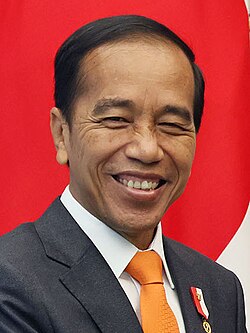 Cao in 2020 | |
| State Director of Nainan | |
| Assumed office 7 January 2016 | |
| Preceded by | Lê Tranh Lộc |
| Premier of Nainan | |
| In office 5 June 2015 – 7 January 2016 | |
| Preceded by | Lê Tranh Lộc |
| Succeeded by | Hoàng Lan Mai |
| Assemblyman of the People's Assembly of Nainan | |
| In office 20 November 2012 – 5 June 2015 | |
| Preceded by | Dương Quỳnh Giang |
| Succeeded by | Ngô Sương Sương |
| Mayor of To Song | |
| In office 1 October 2000 – 20 November 2012 | |
| Preceded by | Trịnh Hữu Nam |
| Succeeded by | Lương Trung Nguyên |
| Personal details | |
| Born | 2 February 1948 (Age 75) Sen Voi, Duyên Dáng Province |
| Political party | Nainan People's Solidarity and Longevity |
| Spouse(s) | Huỳnh Thùy Anh (m. 1986, div. 2001) Lý Kim Hòa (unmarried) |
| Children | Duy My Hùng |
| Alma mater | National University of Canhdong |
- This is a Nainese name; the family name is Cao (高).
Cao Long Phong (Nainese: 高龍酆; Born 2 February 1955), is a Nainese politician and statesman who has is currently serving as the State Director of Nainan. He previously served as the Premier of Nainan from 2015 to 2016. He served as Mayor of To Song from 2000 to 2012, and is a former agent of the Van Dieu during the 1980s and 1990s. He has been a major player in Nainese politics for decades, and is one of the closest allies of Hoàng Lan Mai, daughter of Hoàng Viện Trai, and current Premier of Nainan and General Secretary of the Nainan People's Solidarity and Longevity. He had served as a member of the People's Assembly of Nainan from 2012 to 2015.
Cao was born in Sen Voi, Duyên Dáng Province in 1955 and would grow up in a political wealthy family. His family would flee to Kuthina during the Nainese Civil War and returned to To Song afterwards. He would attend Canhdong University and would become a member of the YPN. He would join the NPSL as a member of the party's intelligence wing.
He later joined the Van Dieu, Nainan's secret police. He would conduct operations in the regions of Quan Kim and Nyaram Khet against separatist cells. He would be known for his lead role in a hostage situation. He later would leave the Van Dieu and become Mayor of To Song in 2000. Here he would push an authoritarian policy against crime using extrajudicial killings and spying to fight organised crime.
He later joined the People's Assembly in 2012 and became a leader of the hardliner faction that supports originalist leads of the party. He would eventually become Premier of Nainan under Lê Tranh Lộc and eventually became the State Director in 2016.
Early life
Cao was born in the city of Sen Voi, Duyên Dáng Province in 1955 to a wealthy family, his father was the Mayor of Sen Voi, his mother was of Nyaram descent and a school teacher and leader of the local school district. Cao had two brothers, Van and Khan, and two sisters, Hà and Yen. Cao grew up in a political family, his uncle was a member of the regional assembly of Duyen Dang during the 50s. During the Kingdom of Nainan his family would be supportive of the NPSL.
During the Nainese Civil War the Cao family fled to Kuthina and lived in the Nyaram region of the country until the end of the war and returned to To Song in 1966. Cao would go to the National University of Canhdong, the same university of Nainan's first State Director and founder, Hoàng Viện Trai. He would study politics and later become a member of the Young Partisans of Nainan.
He would becme a major member of the YPN at the university. He would become a assistant and full member of the NPSL's party and would join the party's intelligence wing during the 1970s.
Career
Van Dieu
Cao became a member of the Van Dieu in the mid 1980s, becoming active in the Nyaram regions of the country. He would work in anti-separatist missions in the region, and became closely allied with military officials in Nyaram Khet. He would become a major Van Dieu leader in the region and worked with many ethnic Nyaram agents in fighting separatists.
During a hostage crisis in the Nyaram capitol of Jowkmat, he would be one of the agents involved in resolving and detaining the hostage takers. He would work on an on-and-off career with the Van Dieu, retiring from the Van Dieu in the 1990s.
Mayor of To Song
Cao would become the mayor of To Song in 2000 after leaving the Van Dieu. He would lead an anti-crime leadership persona that would attempt to get rid of organised crime in the city, becoming extremely successful, using tough policing and violent methods to get rid of them. He would be accused by foreign groups of using human rights abuses such as torture to get rid of crime, he would work closely with the Van Dieu to help get rid of organised crime.
The government of To Song would celebrate becoming a "shining example" of leadership in Nainan. They would call for more hardliner politics based around the original ideology of the NPSL, Tự Ý Chí.
Cao would become a well-known member of Nainese politics by the 2010s due to his hardliner policies and would go ahead to enter national politics. He would make a public statement supporting Shangea during Operation Eastern Protection against Kuthina.
Assembly Membership
He would serve a member of the People's Assembly for 6 years. He would become close allies with Hoàng Lan Mai, daughter of NPSL founder Hoàng Viện Trai and hardliner. They would work to rebuild the hardliner originalist faction of government, which had been falling out since the 1980s.
They would form the Great Resolve Bloc and him, Mai, Văn Anh Khải, and Mai's brother, Hoàng Lan Trúc, would become known as the four "Hoangists", the leadership of unofficial bloc. Despite Mai's leadership skills and prowess, Cao had a personality that made him more appealling to the public, military, and party members. His policies had made him a leader for hardliners, eventually he would become Premier under Lê Tranh Lộc in 2015.
During this time he became popular with the younger generations of Nainan who had become more lenient towards hardliner politics, and developed a cult of personality surrounding him.
Premiership

As Premier of Nainan he would try and be a dealbroker between the hardliners and reformists of the government. He would work to align Nainan with Shangea and cool tensions with countries like Dezevau and Lavana, however reformists had pushed for more alignment with Zorasan, leading to disagreement on foreign policy between the Premier and State Director. He would make numerous visits to countries like Shangea, Siamat, Heijiang, Zorasan, Hacyinia, and North Kabu.
He would be able to successfully get his ally Mai into becoming leader of the NPSL after the death of it's previous leader Trầm Bá Cường in 2015. This lead to further disputes between the hardliner and reformist factions of the government.
Cao would then push for a ban of factionalism in the government, this lead to conflict in late 2015 that culminated in the takeover by the hardliners through a soft coup in early 2016, this lead to Cao becoming State Director and Mai becoming Premier.
State Directorship
Cao became State Director of Nainan in January 2016 and would begin with banning factionalism from the government and cracking down on reformists. He would pass bills that would bring harsh punishments for those who stray away from the party line. He would also put down small protests that began in 2015.
In 2016 he pushed a policy that would further push red-tagging on rights groups in the country, calling them names like terrorists, saboteurs, and criminals.
Cao was the forerunner in creating a social credit system known as the Community Merit System which would track the actions of Nainese citizens and create a blacklist for those considered "unvaluable" or with low community merit. This system would become fully implemented later on. During the 2022 Hacyinia-Lavana War Cao would call for peace but send support to Hacyinia against Lavana.
He would change Nainan's foreign policy, pushing stronger towards cooling tensions with Lavana and becoming further aligned with Shangea's government even more. He would also begin to push away from alignment with Zorasan. He would fully pass the Community Merit System nationwide and begin a program to rebuild the Van Dieu. He and Mai's leadership has been considered a sharp return back to Nainan's olden days of more harsh dictatorship.
Cao referes to his ideology as "Resurgent Tự Ý Chí" most commonly however referred to as "Caoist Tự Ý Chí", it is originalist in nature but emphasises a more outward form of nationalism in instead of more isolationist methods seen during Trai's rule. It still support most of the principle parts of the ideology outside of foreign policy, which is much more pragmatic.
Policies
Domestic
The government of Cao has been considered more authoritarian than previous ones. The government began reforms in 2020 that would revamp the constitution removing power from the judicial and subnational branches of government.
During his rule he instated the death penalty for some forms of speech against the government, as well as drug-related crimes, which he considers a "poison in southeast Coius". During his rule he harshened the penalty of same-sex marriage being conducted, and banned homosexual themes in all Nainese media.
He would rebuild the military apparatus, claiming that global tensions "demand the people be ready for warfare". He also banned all foreign websites in Nainan, which he considers to be "the new frontier of defending our nation".
Foreign
He would instate a more pragmatic form of foreign policy when it comes to areas such as the Hacyinia and Lavana conflict, although he would eventually form more of a friendlier bond with the Hacyinians. He has called for reopening Nainan to a friendlier relationship with the Brown Sea Community.
When it comes to Shangea, he has called them Nainan's "Brother in arms and blood, we are devoted to maintaining our friendship with the Shangean nation and support them in all of their endeavors." His policy has seen a drastly push towards supporting the Shangean government of Yuan Xiannian. Cao has swayed away from Nainan's relationship with Zorasan.
He is also a close ally of the governments of Siamat and Heijiang. He considers Siamat "similar to us in their struggle against primitive monarchist threats", in reference to Siamat's relationship with the government of Kuthina.
Controversies
Extrajudicial killings
Cao has many controversial policies and actions that make him one of the more difficult leaders in southern Coius. During his time in the Van Dieu, he has stated that he had committed extrajudicial killings against separatists and organised crime members. During his time as Mayor of To Song, he made similar policies, allowing the police to commit more extrajudicial killings against organised crime members, human rights organisations say he was one of Nainan's worst offenders. Similar policies occured after becoming State Director in 2016, many claim he and his allies want Nainan to return to pre-1980s dictatorship where the government has extreme power over it's people.
Senrian genocide denial
Similar to his Shangea counterpart Yuan Xiannian, he has made statements denying war criminal actions by the Shangean Empire against Senria during the Great War, stating that they were "exaggerated" and "misrepresented beyong belief". He fully back's Yuan's position on the Senrian Genocide.
Siamat war crime denial
Cao has made statements defending the Van Dieu's actions supporting the revolutionary forces during the Siamat War. He defends the Van Dieu agents' support of Siam Muoy and Sba Svay war crimes and ignorance by the Van Dieu to stop them from being committed. He even goes as far as stating that "some of the imperialist dogs in the Siamat conflict deserved what happened to them, I will not deny this."
Personal life
Cao has been married to Huỳnh Thùy Anh from 1986 to 2000, whom he has had all of children with. He and his wife had met at the University of Canhdong in the 1970s.
Cao's three children all have political positions, two of them are members of the People's Assembly, his son Duy and daughter My, his youngest son, Hùng is a leader in the NPSL and Provincial Assemblyman.
Cao's siblings also still continue to, his brother Khan being mayor of Sen Voi and sister Yen being a member of the Provincial Assbemly of Duyên Dáng Province.
Cult of personality
Cao Long Phong has developed a Cult of Personality that is similar to that of State Directors Hoàng Viện Trai and Nghiêm Nài Phúc. He was able to change the consitution in 2020 in order to raise the status of the position of State Director and party General Secretary.
Since his rise of politics in the 2000s he has gained a large amount of support from his people and since 2016 he has built a base of support amongst the government and people.
He is known by the people as the "Great Leader" (Thủ lĩnh vĩ đại), and is during constitutional reforms in 2020 he is named as "representative of the soul of the nation of Nainan". He retains a large amount of support from some foreigners as well, such as in Shangea and other Coian nations there are many who admire him.
In the 2020 constitution reforms made by Cao, he would institutionalise the role of State Director and would also form a group of supporters of himself known as the "Cao's Warriors", some call it the world's only state-mandated "fan club" of a world leader. It usually organises rallies and makes propaganda and internet trolling to support Cao's rule.
Heads of State of Vanhar
President of the Vanhar Republic
| President | Term of office | Party | |||
|---|---|---|---|---|---|
| 1 | 
|
Marcos Branco 1793–1843 |
1839 – 1843 |
Vanharian Revolutionaries | |
| 2 | 
|
António Antunes 1796–1859 |
1845 – 1851 |
Vanharian Revolutionaries | |
Governor of the State of Vanhar
| Governor | Term of office | Party | |||
|---|---|---|---|---|---|
| 1 | 
|
António Antunes 1796–1859 |
1845 – 1851 |
Vanharian Federalists | |
| 2 | 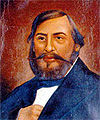
|
Júlio Ramires 1810–1866 |
1851 – 1866 |
Vanharian Centralists | |
| 3 | 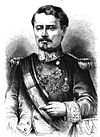
|
Martim Rocha Casa 1825–1879 |
1866 – 1878 |
Vanharian Centralists | |
| 4 | 
|
Carlos Villagrán 1841–1906 |
1878 – 1886 |
Vanhar Liberal Party | |
| 5 | 
|
Romeo Martí Fjellner 1851–1918 |
1886 – 1900 |
Vanhar National Party | |
| 6 | 
|
Teodoro Agar 1865–1944 |
1900 – 1916 |
Vanhar National Party | |
| 7 | 
|
Edmundo Coração 1869–1931 |
1916 – 1920 |
Vanhar Liberal Party | |
| 8 | 
|
Diogo Nogueira Hornqvist 1877–1931 |
1920 – 1924 |
Vanhar Liberal Party | |
| 9 | 
|
António Lagerfeld 1880–1936 |
1924 – 1933 |
Vanharian National Functionalists | |
| 10 | 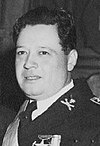
|
Samuel Botelho 1905–1947 |
1933 – 1937 |
Military (1933-1935) National Progressive Party (1935-1937) | |
| 11 | 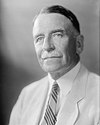
|
Duarte Jarl 1874–1944 |
1937 – 1944 |
National Progressive Party | |
| 12 | 
|
Vicente Rebelo Mata 1900–1984 |
1944 – 1961 |
National Progressive Party | |
| 13 | 
|
Gustavo Anderberg 1924–1995 |
1961 – 1981 |
Military | |
| 14 | 
|
Asimo Luzilho 1930–2011 |
1981 – 1988 |
Military | |
| 15 | 
|
Bernardo Erhardsson 1949– |
1988 – 1989 |
Independent | |
President of the Vanharian Free State
| President | Term of office | Party | |||
|---|---|---|---|---|---|
| 1 | 
|
Bernardo Erhardsson 1949– |
1989 – 1996 |
Vanharian Constitutionalist Party | |
| 2 | 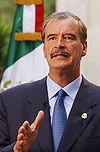
|
Pedro Riveira 1945– |
1996 – 2000 |
Social Sotirian Unity | |
| 3 | 
|
Geraldo Saldanha 1958– |
2000 – 2008 |
Broad Liberation Front | |
| 4 | 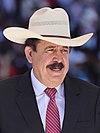
|
Sérgio Lindahl 1955– |
2008 – |
Broad Liberation Front | |








